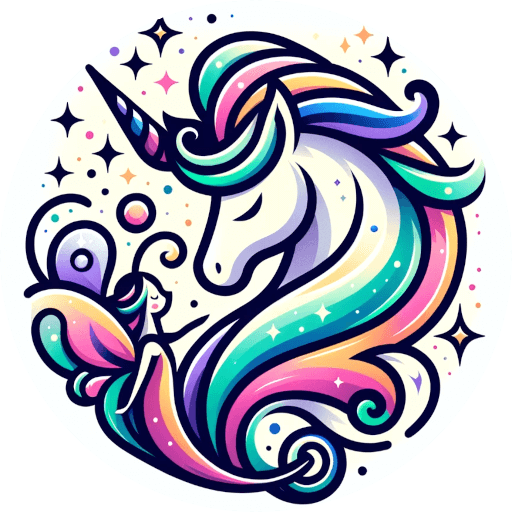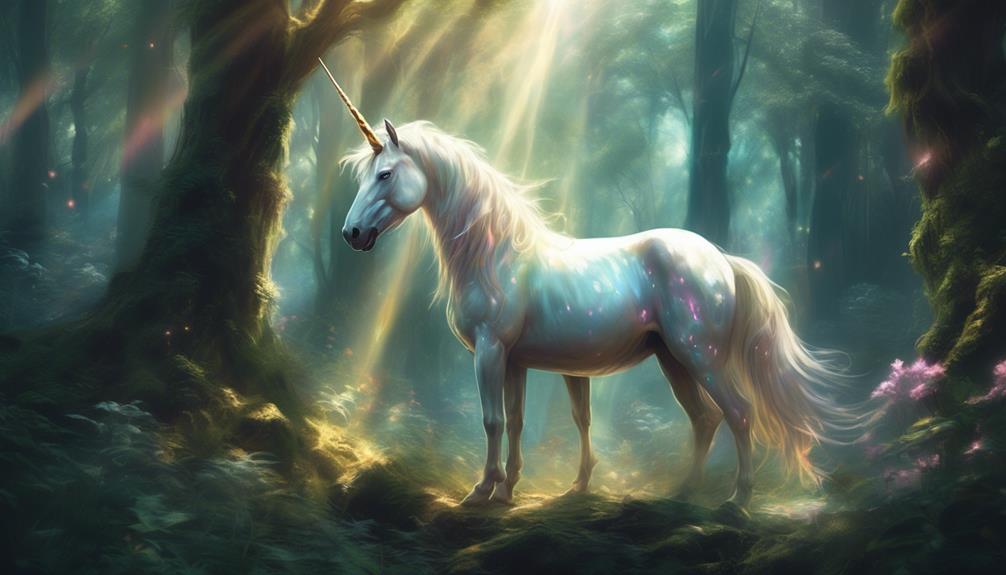In the world of folklore and fantasy, unicorns have long been the embodiment of ethereal beauty and mystery. As the article 'MYTHICAL CREATURES UNVEILED: Unicorns' Magical World Explored' unfolds, readers will be transported into a realm where reality and enchantment intertwine.
From their ancient origins to the modern-day fascination, the allure of unicorns has endured through the ages. But what secrets lie beneath the surface of this enigmatic creature? As the article unravels the layers of unicorn mythology and symbolism, it promises to offer a fresh perspective on these legendary beings, shedding light on their enduring appeal and cultural significance.
Key Takeaways
- Unicorns have been depicted in various forms throughout history and are associated with innocence, purity, freedom, and power.
- They possess magical powers derived from their spiraling horns, including healing properties and the ability to bring good luck.
- Real-life unicorns include the Siberian unicorn, a giant rhino in Kazakhstan, and narwhals, which may have inspired the modern unicorn.
- Baby unicorns, known as foals or sparkles, grow up slowly and enjoy playing with their friends.
Historical Significance of Unicorns
Unicorns have long held a significant place in mythology and folklore, embodying a symbol of purity, freedom, and power across various cultures throughout history. In ancient Mesopotamia, the unicorn was depicted as a wild bull with a single horn, symbolizing strength and dominance.
Chinese culture revered the unicorn as a symbol of good fortune and divine power, associating it with harmony and prosperity.
European folklore portrayed the unicorn as a creature of purity and grace, often linked to the healing powers of its horn. In Christian mythology, the unicorn became an allegory for Christ, with its untamable nature representing the wildness of Christ's divinity.
Across cultures, unicorn legends and folklore have woven a rich tapestry of symbolism, reflecting humanity's timeless fascination with these enchanting creatures.
Magical Powers of Unicorns
The historical significance of unicorns as symbols of purity and power across cultures provides a compelling backdrop for exploring the magical powers attributed to these enchanting creatures. Unicorn horns are believed to possess healing properties, and their significance in mythology spans various cultures. The horn's alleged ability to heal and prolong life has made it a sought-after item.
Additionally, there's a deep-rooted connection between unicorns and dreams, with many cultures believing that encountering a unicorn in a dream provides guidance and symbolism. This mystical association between unicorns and dreams has captivated the imagination of people throughout history, further enhancing the allure and wonder surrounding these mythical creatures.
The healing properties of their horns and the symbolic significance in dreams contribute to the enduring fascination with unicorns.
Real-Life Unicorns and Their Inspirations
Siberian unicorns, believed to be the inspiration for the modern concept of unicorns, were giant rhinoceros-like creatures that roamed the grasslands of Kazakhstan. They had a heavy and woolly appearance, resembling a cross between a rhinoceros and a woolly mammoth.
The connection between unicorns and their diet is intriguing. Unicorns primarily feed on berries, nuts, and seeds found in the wild, and they often share their food with birds and other creatures. It's interesting to note that leaving out sugar in their food ensures the safety of other animals.
Additionally, the notion that narwhals may have inspired the modern unicorn adds a fascinating layer to the discussion. Narwhals use their horns in gentle fencing matches, and they live in families, frolicking in the ocean. These connections shed light on the mythical creature's real-life inspirations.
Fascinating Facts About Unicorns
Early depictions of unicorns in various cultures often portrayed them with physical traits resembling those of rhinos or oxen. Unicorns have been the subject of fascination for centuries, and there are many fascinating facts about these mythical creatures.
Unicorns are often associated with purity, innocence, and power, and they've been used as a symbol of the life of Christ. In terms of diet, unicorns are believed to feed on a variety of natural foods, including berries, nuts, seeds, and sweet grass found in the wild. Their diet is carefully balanced to ensure the safety of other animals and the environment.
Additionally, unicorns hold significant symbolism, representing rarity, value, and even serving as a symbol for the LGBTQ+ community, offering brightness and happiness to oppressed minorities.
Unicorn Lifestyle and Behavior
Exploring the lifestyle and behavior of unicorns reveals a fascinating mix of magical abilities and natural instincts that shape their existence. Unicorn social interactions are characterized by their preference for living in herds, providing protection and companionship. They're sociable creatures, spending a significant amount of time together, with some unicorns choosing solitude.
A group of unicorns is known as a blessing, while older and wiser individuals often live alone. In terms of daily routines, unicorns rise just before dawn, quenching their thirst as the morning mist clears. Most unicorns sleep during the night, dreaming beneath the stars, similar to humans.
Adult unicorns collectively care for their young, highlighting their strong sense of community. These behaviors signify the unique and intriguing lifestyle of unicorns, blending magical elements with natural inclinations.
Frequently Asked Questions
What Is the Significance of Unicorns in Modern Pop Culture and Symbolism?
Unicorns hold significant cultural value, appearing in marketing and fashion. Their symbolism represents rarity and power, particularly in the LGBTQ+ community. Their bright and happy image offers strength to marginalized groups.
Are There Any Famous Myths or Legends Involving Unicorns From Different Cultures?
Unicorn legends and myths exist in different cultures, symbolizing purity and power. Ancient Greeks considered them untamable, while Chinese folklore revered their healing horns. These tales continue to inspire wonder and imagination today.
How Do Unicorns Communicate With Each Other and Other Creatures?
Unicorns communicate through telepathic abilities, fostering a strong social bond within their herd. They also possess a magical language, enabling cross-species communication. This unique ability contributes to their elusive and mystical nature.
Do Unicorns Have Any Natural Predators or Threats in Their Habitats?
Unicorns' habitats are protected due to conservation efforts. While predators and natural threats are speculative, their mythical status and rarity warrant habitat protection. Conservation efforts are crucial in ensuring the safety of these magical creatures.
Are There Any Documented Sightings or Encounters With Real Unicorns in Recent History?
Recent sightings of real unicorns have not been scientifically documented, but various folklore tales and cultural significance have kept the idea alive. Eyewitness accounts and cryptozoology research add to the mystery of these mythical, magical creatures.

